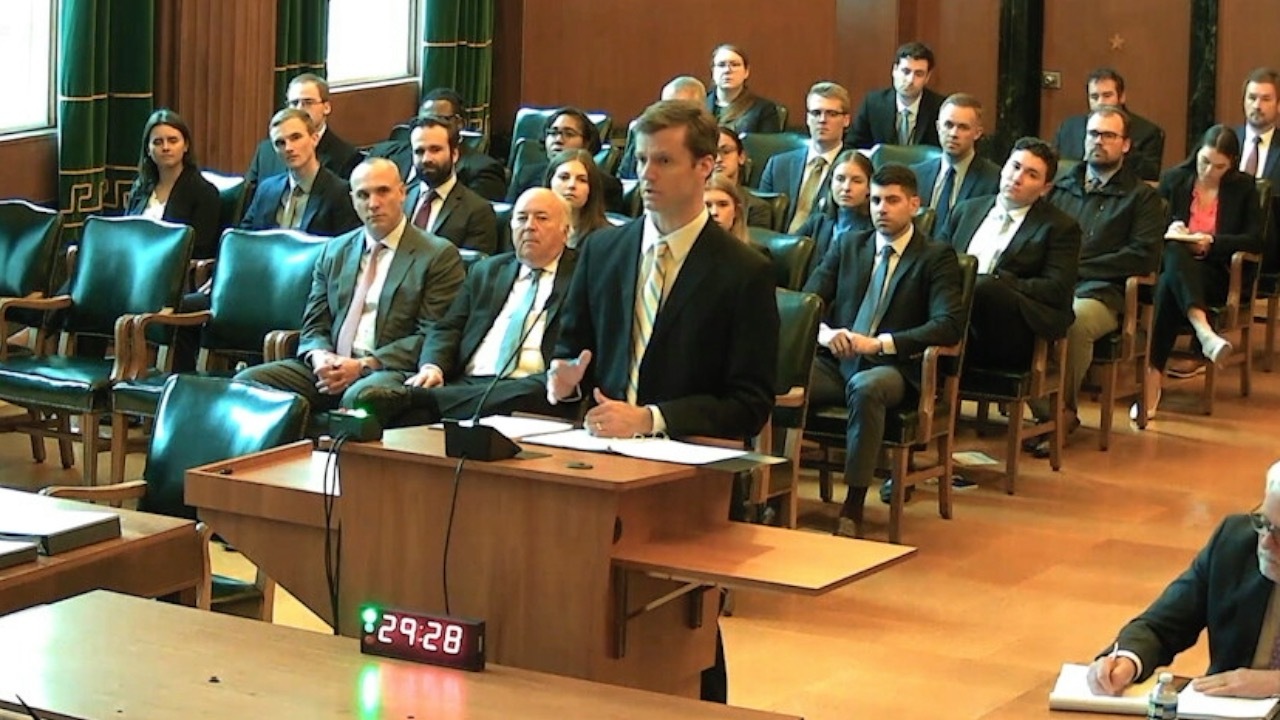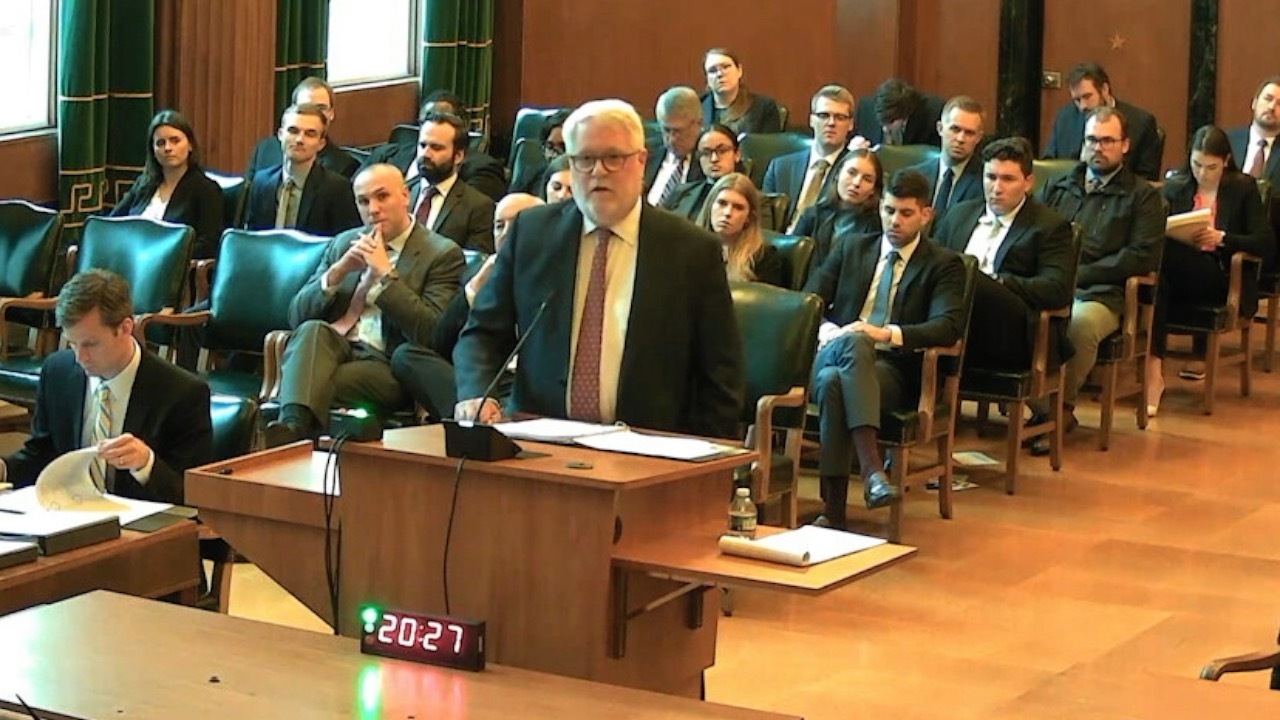- The North Carolina Supreme Court expressed skepticism about a defamation lawsuit targeting lawyers who worked with voters who filed election protests after the 2016 governor's race.
- Four voters working with lawyers tied to the Democratic Party and left-of-center activist groups filed the suit against a Washington, DC-based law firm and the Pat McCrory Committee Legal Defense Fund.
- The state Court of Appeals ruled in 2021 that the lawsuit could proceed. Appellate judges ruled that the lawyers did not enjoy legal protection from a defamation case because they were not participants in the election protest proceedings.
The North Carolina Supreme Court raised concerns Thursday about a lawsuit targeting lawyers who helped file election protests after the state’s 2016 governor’s race. One justice described the plaintiffs as asking the court to “blow up” protections provided to people engaged in those protests.
Only the court’s five Republican justices heard oral arguments in Bouvier v. Porter. Both Democratic justices were recused. Both had been involved in the case during their earlier work leading the left-of-center Southern Coalition for Social Justice.
Four voters working with the coalition and with lawyers tied to the Democratic Party sued the Washington, DC-based Holtzman Vogel law firm, some of its individual lawyers, and the Pat McCrory Committee Legal Defense Fund.
The lawsuit claimed that the defendants had defamed the voters in filing election protests after the 2016 election. Current Democratic Gov. Roy Cooper unseated the incumbent McCrory, a Republican, in that election.
The protests suggested that the targeted voters had cast ballots in more than one state. The accusations were false. The defendants helped provide information to people who filed the actual protests.
Neither McCrory nor his official campaign committee is involved in the lawsuit.
The state Court of Appeals ruled in 2021 that the case could proceed against the law firm, four of its associates, and the McCrory legal defense fund. Appellate judges dropped one of the original defendants from the case.
“This case concerns statements made in election protest forms that were submitted to county boards of elections and initiated election protest proceedings,” said Craig Schauer, the defendants’ lawyer. “The Court of Appeals held that the statements in those forms were absolutely privileged. In other words, the only statements that this case concerns are absolutely privileged statements.”

A statement with “absolute privilege” cannot be the basis of a defamation claim.
“Despite those statements being absolutely privileged, the Court of Appeals held that one defendant … is entitled to the immunity for having made the statements — associated with the absolute privilege — but the remaining defendants … were not entitled to the immunity for making the exact same statements,” Schauer added. “That’s not the law in North Carolina.”
Schauer criticized the Appeals Court for creating a “participants requirement.” He said appellate judges ruled that only participants in the election protests enjoyed the legal protection.
Press Millen, the plaintiffs’ lawyer, defended that ruling. “This privilege does not exist to permit libel,” Millen argued. “The privilege exists to permit the fair and efficient administration of justice.”
Millen predicted problems if out-of-state lawyers who did not file actual election protests could enjoy the same type of privilege as voters or lawyers participating directly in protest hearings.

“What this court will be doing if this court reverses the Court of Appeals is this court will be creating a group — a creature — who is entirely able to act with impunity in the context of judicial and quasi-judicial proceedings without being lawyers, witnesses, or parties — who has no safeguards that apply to them in any respect,” Millen argued.
Chief Justice Paul Newby cited a state Supreme Court precedent that supported protecting comments made during official government proceedings. “At the end of the day, we made it clear that a person has a fundamental right to petition the government,” Newby said.
“We allow the process itself to determine the veracity of what’s presented,” Newby added.
Justice Richard Dietz also looked to the court’s precedents.
“I’m just not seeing how you can win this case without completely upending all of the caselaw we have in the Court of Appeals and the Supreme Court about what the occasion is and how it can include people whose communications with the person who’s actually the filer are there solely for the preparing of the filing in the judicial proceeding or quasi-judicial,” Dietz told Millen.
Dietz suggested that Millen’s clients should have pursued a different type of lawsuit. “It seems to me that this case has the wrong claims in it because the defamation claim under our caselaw is absolutely privileged,” he said.
“I’m just struggling to figure out why you’d want us to blow up this very settled protection in this scenario when there are other claims that could be pursued if you believe you’re right,” Dietz added.
Justice Tamara Barringer questioned how the defendants in the Bouvier case could be accused of publishing falsehoods and not be considered participants in the election protests. “I have trouble understanding how one can publish if one is not participating,” she said.
Justice Trey Allen emphasized the importance of legal immunity in election protests. “It seems to me that the whole reason we would apply the immunity in the election protest context would be so that people won’t be intimidated into not making protests when there’s a basis to do so,” he said.
“We want people to come forward if they have information about unlawful voting practices so that our elections will be valid,” Allen added.
The state Supreme Court agreed in April 2023 to take the case. The high court also blocked the Appeals Court’s 2021 decision at that time.
In a 2023 court filing, the defendants emphasized their argument that the contents of election protests are protected by an “absolute privilege” against legal action.
“The Court of Appeals declared that ‘on the Record and facts before us, absolute privilege applies to the election protests containing the allegedly defamatory statements in this case.’ That declaration should have been the end of this case” defendants’ lawyers argued. “Instead, the Court of Appeals held that, although the statements at issue were absolutely privileged and Porter was immune, Defendants were not immune for the same statements because they were not ‘participants.’ The lower court’s holding was a clear departure from this [Supreme] Court’s absolute-privilege jurisprudence.”
The plaintiffs “seek to vilify Defendants” rather than present a legal case dealing with the absolute privilege issue, according to the court filing.
“Defendants never accused Plaintiffs of ‘felony double voting’ or ‘voter fraud,’” the brief explained. “The election protests said: Upon review of early voting files from other states, it appears that [a number of] individual[s] cast ballots in both North Carolina and another state. Casting a ballot in more than one state is a clear violation of North Carolina and federal election laws. Therefore, these ballots were erroneously counted and tabulated by the [identify county] County Board of Elections.”
“The words ‘voter fraud,’ ’fraud,’ ‘felony,’ and ‘crime’ never appear in the election protests,” the brief continued.
The defendants deny claims that their actions were “reckless.” They also question the plaintiffs’ actual harm from the election protests.
“Plaintiffs’ brief exaggerates their victimhood,” according to the brief. “Not only did Plaintiffs admit they suffered no real harm; they invited much of the ‘negative attention,’ about which they now complain.”
The brief cites the plaintiffs’ voluntary statements about the election protests to television reporters. One plaintiff discussed the protests in Facebook posts. Another sat for a video interview with Democracy North Carolina activist Bob Hall, whose organization was “advancing a cause.” One plaintiff “characterized this lawsuit not as an effort to secure a monetary remedy, but instead as an opportunity to make a ‘personal political statement.’”
“If Plaintiffs’ objective is to make a ‘political statement’ by maligning Defendants, then their factual narrative may serve a purpose,” defendants’ lawyers wrote. “But for purposes of determining whether the statements in the election protests are absolutely privileged, Plaintiffs’ ‘salient facts’ are irrelevant. The relevant facts are the facts that the Court of Appeals found (and Plaintiffs do not dispute): the allegedly defamatory statements were made in and relevant to the election protest proceedings.”
“The statements are privileged. According to this Court’s precedents, the facts here dictate that Defendants cannot be liable for defamation,” the brief added.
Before the Appeals Court ruling, “no court in North Carolina has ever before applied a ‘participants’ standard to the absolute privilege,” according to the brief. Appellate judges had determined that the privilege applied only to participants in election protest proceedings.
“[T]he decision below is the only instance in over 170 years of jurisprudence in which a North Carolina court has withheld absolute privilege from a defendant despite the allegedly defamatory statement having been made in due course of a judicial proceeding,” defendants’ lawyers wrote. “Notably, the holding is not just an anomaly within North Carolina. Plaintiffs could not find a case anywhere in the United States in which a court denied a defendant absolute privilege when a statement was made in due course of a judicial proceeding.”
“Absolute privilege provides ‘automatic and impenetrable immunity’ to anybody who makes a statement in due course of a judicial proceeding, and Defendants ask only to be treated — as Porter was — like anybody else,” the brief continued. “Plaintiffs, though, label Defendants as ‘unlicensed,’ ‘out-of-state,’ and ‘non-nonparticipants,’ to carve out Defendants as a special class who should be excluded from absolute privilege. Absolute privilege does not recognize such labels — it is absolute.”
Lawyers for the four plaintiff voters asked in their own court filings for the state Supreme Court to uphold the Appeals Court’s decision.
“In November 2016, the individual Defendants and their Defendant Law Firm, on behalf of the [McCrory] Defendant Defense Fund, prepared and filed ‘election protests’ in 50 counties across North Carolina using local voters they convinced to serve as nominal ‘protesters’ in order to fulfill a statutory requirement. The Law Firm Defendants did so despite the fact that they were out-of-state lawyers unlicensed to practice in North Carolina and lacked any knowledge or experience with election law or election protests in North Carolina,” according to a brief filed by plaintiffs.
“When Defendants’ protest strategy unraveled later that same month, they pulled out of North Carolina leaving the protesters, as one protester put it, ‘hung out to dry.’ By acting through others, though, Defendants left little paper trail of their activities and were able to escape the prospect of any discipline in North Carolina,” the brief continued. “Plaintiffs here are the collateral damage of Defendants’ effort to sow confusion and create post-election chaos.”
“In their protests, Defendants falsely accused Plaintiffs – ordinary North Carolina voters who simply exercised their right to vote – of felony double-voting. Defendants’ false accusations exposed Plaintiffs, not otherwise public figures, to unwanted media attention and substantial public ridicule,” plaintiffs’ lawyers wrote.
Plaintiffs defend the state Appeals Court’s decision. “Consistent with years of precedent, the Court of Appeals unanimously affirmed a summary judgment ruling that Defendants were not entitled to absolute immunity for their unlicensed actions in North Carolina. North Carolina law has consistently extended the protections of absolute immunity from defamation claims in judicial and quasi-judicial proceedings only to participants in those proceedings, i.e., parties, counsel, and witnesses.”
“Defendants here fit none of those categories, especially after they expressly disclaimed that they were providing legal representation in the election protests at issue,” according to the brief. “Yet Defendants insist that absolute immunity should be extended to them despite their non-participating status in the protests. In short, Defendants argue that North Carolina should create a public policy effectively granting absolute immunity to those engaged in the unauthorized practice of law, thereby immunizing out-of-state intermeddlers who will be free to interfere in North Carolina elections with no possibility of negative consequences.”
There is no deadline for the state Supreme Court to issue a ruling in the case.